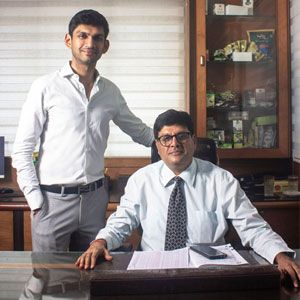
Tea, the world’s second most consumed beverage, has seen growing demand across the Middle East, Southeast Asia, and CIS countries, with Western nations also embracing it for its health benefits, such as lower caffeine content, antioxidants, and anti-inflammatory properties. As tea becomes more integrated into daily routines worldwide, ensuring consistent quality remains a challenge due to seasonal production variations.
Nevertheless, maintaining year-round quality is crucial to meeting consumer expectations, making quality control a key factor in the tea industry. In addition, the biggest issue lies in contamination, but by controlling this factor, companies like Ananda Bag can ensure high-quality output. Asia Business Outlook got in touch with Ishaan Chokhani, Executive Director at Ananda Bag, to understand how the company balances these challenges while maintaining its long-standing reputation for quality.
Below is the excerpt from our recent interaction.
Could you please give a brief overview about the company?
As a family, our journey in the tea industry began in the 1850s, with Ananda Bag officially incorporated in 1920, after starting as a partnership firm. I’m now the sixth generation in this business, and over the years, we’ve realized that success comes from evolving with the times while staying true to the traditional practices that have brought us here. We’ve found a balance between the old and the new by integrating modern technology into our estates and packing units, such as plucking machines, which initially faced criticism, but we’ve managed to maintain quality while enhancing efficiency.
We’ve also automated much of our operations, reducing manual handling and contamination, which has significantly improved quality. From blending to packing, we’ve embraced machinery while still holding onto hand plucking traditions, ensuring that we honor the legacy left by our forefathers and continue to uphold our reputation in the market. Today, we operate as a group of companies, with multiple entities under our umbrella.
Together, we manufacture over 2 million kilograms of tea annually and trade an additional 3 to 4 million kilograms. In total, Ananda Bag handles approximately 4 to 5 million kilograms of tea each year.
You must implement stringent protocols across your estates and factories. How does your production process ensure the highest quality standards?
At our Assam estates, controlling contamination is key to consistently delivering top-quality tea. We enforce strict protocols, requiring workers to wear blending socks, shoe covers, hair covers, and masks to prevent contamination and protect them from tea dust. We also use dehumidified chambers to prevent moisture absorption for packing and sorting, preserving the tea’s quality and taste. By adhering to these standards and harvesting only soft, fine leaves, we ensure a well-rounded, full-bodied tea, where maintaining a high fine leaf count addresses 60 percent of production quality.
Fermentation happens in a controlled humidified chamber. Our blending and packing unit in Kolkata expands over 100,000 sq feet and has all the necessary export certification required for various countries such as GMP, ISO, HACCP, Halal and more. We also comply with EU and organic regulations when required by our buyers, alongside adhering to FSSAI and USDA/FDA norms. We integrate this into our blending process to ensure that each buyer receives the precise chemical and flavor profile they need.
How do you maintain batch consistency across seasons and borders?
The flavor profile and cup quality of tea naturally vary, not just from season to season but also from estate to estate. This makes blending crucial in maintaining a consistent flavor profile throughout the year for our buyers. We have a team of expert blenders and tasters with over 150 years of collective experience. Before any blend moves to the packing stage, it must be approved by at least two of these experts, ensuring quality and consistency in every batch. To maintain a standard quality, we utilize our Calcutta blending unit, which holds a stock of over 500,000 kilograms of tea.
I believe the future of the tea industry lies in instant tea and premixes, as the world is moving at such a fast pace that people don’t have time for traditional brewing
What’s in store for Ananda Bag in the near future?
I believe the future of the tea industry lies in instant tea and premixes, as the world is moving at such a fast pace that people don’t have time for traditional brewing. We’re already working on hot water-soluble blends like Karak instant tea, cardamom, and masala flavors, using natural ingredients and extracts. We’re also developing cold water-soluble iced teas in flavors like strawberry, orange, lemon, and mint. In addition, we’re gradually expanding into the export market, especially in North America and Europe, which currently make up less than 10 percent of our exports, but we aim to grow this significantly. We’ve also formed partnerships worldwide, offering packaging services under various brands.
Essentially, we’ve built a complete supply chain in the tea industry, enabling us to provide solutions at any point, whether a buyer needs bulk tea, garden-fresh estate tea, blended teas, or consumer packaging under their own brand or ours. We offer everything from 5 kg bags to small pouches, tins, jars, aluminum foils, tea bags, instant tea, and premixes. Our goal is to be a one-stop solution for anyone in the supply chain, offering exactly what the market demands, whether it’s black tea, green tea, Darjeeling, specialty tea, instant tea, or tea bags. We want to provide the perfect tea experience for every customer, from importers to end consumers.
Ishaan Chokhani, Executive Director
Ishaan Chokhani is the Executive Director at The Ananda Bag Tea Co. Ltd., managing key areas such as marketing, sales, operations, and finance to drive seamless company performance. With a BSc from the University of Southern California, he brings strong expertise in strategic planning and business management.
We use cookies to ensure you get the best experience on our website. Read more...